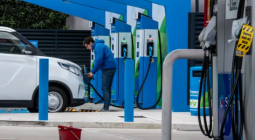UK government scraps plan to ban sale of gas boilers by 2035
‘Future homes standard’ will not mandate replacing boilers with environmentally friendly alternative
The government is to scrap the 2035 ban on gas boilers in its new housebuilding standards.
The previous Conservative government had laid plans to phase out gas heating for homes by banning the sale of new gas boilers by 2035, so people replacing their gas boilers after that date would instead have to buy a heat pump or other environmentally friendly way of heating homes.
Using gas to heat the UK’s homes adds a huge amount to the country’s carbon footprint; home heating accounted for 18% of all UK greenhouse gas emissions in 2021, and the average UK gas boiler is responsible for more CO2-equivalent emissions in a year than taking seven transatlantic flights.
The former prime minister Rishi Sunak was criticised by scientists and policy experts when he announced his backtrack on a range of environmental measures. This included significantly weakening the plan to phase out the installation of gas boilers by 2035, instead aiming for only an 80% phase-out.
Now, the plan will be scrapped altogether and there will be no requirement to replace a gas boiler with an environmentally friendly alternative. Government sources confirmed the future homes standard (FHS), expected to be published soon, will not include a ban on gas boilers. They also confirmed there will not be a ban on the sale of gas boilers by 2035 and people will not have to remove them from their homes.
However, minimum standards for energy efficiency in newly built properties under the rules will preclude the installation of gas boilers. The government is also extending the £7,500 grant for people to install heat pumps, hoping this will boost uptake.
The FHS will mandate that developers build homes in a low-carbon way. Previous briefing on what it would include suggested it means all new homes would have to be built with equipment including heat pumps and solar panels.
However, there are reports that elements of the proposed FHS will be watered down, potentially making homes more expensive to heat as a result and passing the cost of switching to heat pumps on to the property owner rather than the developer.
The long-delayed regulations are expected to make solar panels on roofs optional rather than mandatory, as campaigners have called for. Current plans for the FHS are only to “encourage” builders to equip homes with some solar panels “where appropriate”. This is despite the energy secretary, Ed Miliband, having promised a “rooftop revolution” during the election campaign.
A recent study from the MCS Foundation found that equipping homes with heat pumps, solar panels and battery storage would save households living in a typical three-bedroom house more than £46,600 on energy bills over the course of a 25-year mortgage.
Jess Ralston, head of energy at the Energy and Climate Intelligence Unit, said: “Every home we insulate and heat pump we install means we need less gas that will increasingly come from abroad as North Sea output continues its inevitable decline. Customers and industry knowing what long-term, stable incentives and policies will be in place is essential to add confidence to the insulation and heating sectors, which have been badly hit by boom and bust policies and unclear government direction in the past – so an ambitious and clear warm homes plan can’t come too soon.”
A government spokesperson said: “It is categorically wrong to say there has been any change to the FHS. The FHS has only ever been a standard for new-build homes. It has nothing to do with gas boilers in existing homes.”
Countries across Europe are trying to encourage heat pump uptake amid negative media campaigns against the technology. Colder Nordic countries have embraced heat pumps; Norway has 635 for every 1,000 households, while Germany has 47 and the UK just 15.
Cover photo: Home heating created 18% of UK emissions in 2021. Efficiency rules on new builds will preclude the installation of boilers. Photograph: Ronstik/Alamy





